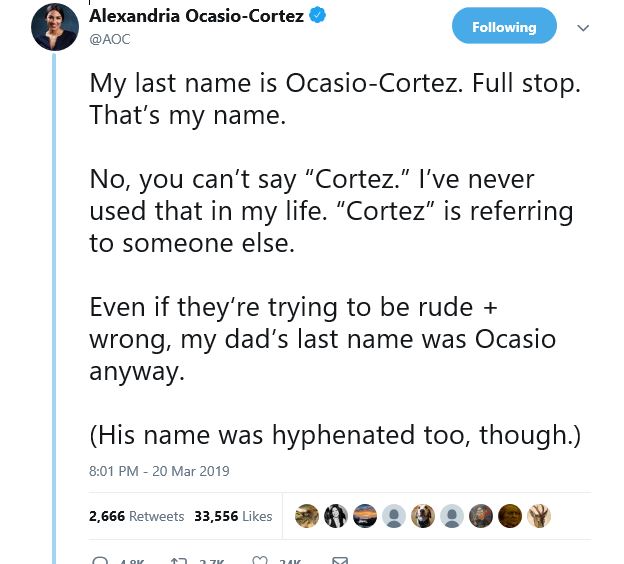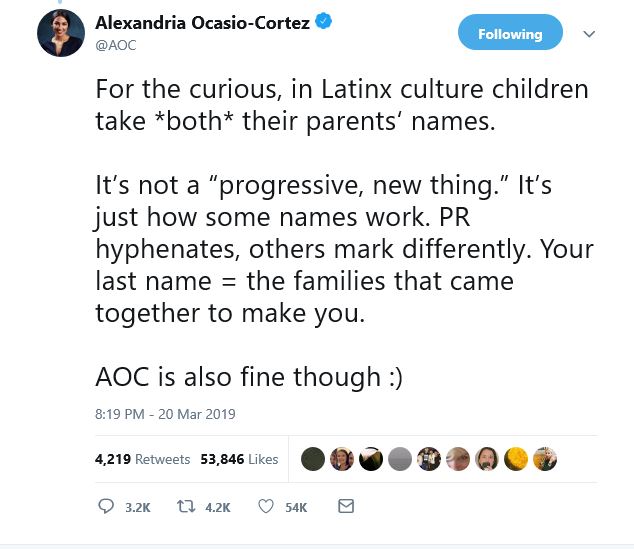Let’s begin with the obvious: There is no Latinx culture. There is a Latin Culture or a Cultura Latina. The “x” at the end shit is a stupid affectation that will get you slapped silly for being a conceited asshole in points south of the US.
The hyphen? Nope, not a Hispanic/Spanish/Latin thing. That is a Feminist thing for those women who wanted to be feminist but did not want to piss off their very rich husbands.
The way Hispanic Culture structures the full name of a person is : First Name + Father’s Last Name + Mother’s Last Name.
For Example, instead of John Fitzgerald Kennedy in the English custom. our 35th president would be John Kennedy Fitzgerald in the Spanish version. It takes a bit to get used when you move and have to fill paperwork against what you have been trained and done for so many years.
Now, Dear Alejandrita is right on the Cortez not being the proper way to address her, the custom is to use only the father’s last name so Alexandria Ocasio is perfectly right for the Hispanic/Spanish/Latin culture, Now, there is a section of people who culturally demand that people address them with all the names give to them by their parents and that is Royalty. Unfortunately for Alejandrita, she does not belong to the Spanish Royalty nor we give a shit and how they are supposed to be “properly” addressed. We she is conceited enough to think herself above the little people, but even Latin America got rid of their Royal influences, so fuck off with the airs of Regal Bitch, Miss Occasional-Cortex.



Alejandrita rhymes with pendejita.
Just saying. 😉
And the hyphen thing is example 3,928,571 of why she is more clueless than a bag of rocks.
So, dumb question, wouldn’t generation N have 2^N last names with 2^N-1 hyphens? There must be a downselect / winnowing process somewhere…
aaaand I am lost…. I was never good at Algebra 😀
For completeness, note that Portuguese reverse this and go mother’s name, father’s name. Thus bike racer Rui Costa’s full name is Rui Alberto Faria da Costa. This doesn’t make AOC any less dumb but makes GFZ readers smarter.
There are also individual cultural differences between every country and culture in the Spanish-speaking world. Despite what American progressives seem to think, Spain is not Mexico, Mexico is not Puerto Rico, Puerto Rico is not Brazil, and so forth.
I won’t pretend any expertise, but I’ve never seen a Spanish-speaking or Portuguese-speaking country where surnames are hyphenated. That seems a purely English-speaking thing.
If someone could point me to contest evidence, I’d be happy to look.
I know nothing about Spanish etc. practice. But hyphenating names is not just done in English speaking countries. If anything, it’s uncommon here, done only for trendy/PC/***ist reasons. But in Holland (and perhaps other European countries, I don’t know) the traditional practice is for married women to use the husband’s last name hyphen their maiden name. That doesn’t carry over to children, however — they use the father’s last name.
Lemme see here. Carry the 1, subtract x, remove the negative coefficient, deep-fry the constant, solve for phi and…
I got nuthin’.
Well, no. They’re not additive like that.
A child takes one of their two surnames (apellidos) from each parent and spouses don’t change their surnames upon marriage the way you do in English culture. So in an English culture, when Mister A marries Miss C, she becomes Mrs. A… That’s not the case in Spanish culture, so when Sr. A B and Srta. C D marry, they become Sr. A B and Sra. C D.
If they have a child, the child will take their father’s first surname and their mother’s first surname. Almost always, the father’s becomes the child’s first surname, with the mother’s becoming the second. So the children of Sr. A B and Sra. C D will be Sr. A C and Srta. A C.
If Srta. A C goes off and married Sr. E F, then they will have children with the name E A…
This makes Spanish family histories really frustrating for Anglophone historians if they don’t have access to a family tree, while simultaneously making it really easy to create family trees. You can’t just write about the “X Family” like you might with, say, “The Kennedy’s” or “The MacMurray’s.” But if you have a decent set of village church birth records — and the Spaniards, Portuguese, and all their colonies were meticulous record keepers — then you can create really accurate histories.
Many surnames were originally, like in many Romance languages, patronymics: Ramírez would be son of Ramiro, López would be son of Lope, etc. This fell out of practice centuries ago, but it’s the origin of a LOT of Spanish surnames which is why so many of them sound so similar… Compare to all the Thompson’s, Richardson’s, and Harrison’s you find in the Anglophone world.
Thanks for enlightening us, Miggy! Always good to get good intel!
It was a slow day and she needed her daily victim fix.
Also, if I were triggered every time someone got my Teutonic name wrong, I’d look like an epileptic at a rave during an earthquake.
My given name is from Scottish Gaelic language, my middle name is from the Normaund language, and my surname is an 19th Century Canadian immigration official trying to render into English what had been a Polish attempt at rendering a Ukrainian place-name… There’s a reason I’ve adopted the nickname “Ish” for real-world use and online (it is also my initials).
I made my piece with people mispronouncing my names long before I was capable of speech.
In English, which is the language that the majority of her district speaks, the standard practice is to refer to a congresswoman in writing a “Rep. Surname (Party Initial State Abbreviation District Number)” which would be “Rep. Ocasio-Cortez (D NY 14).” After you’ve referred to them this way the first time in wirting, you can address them again as “Rep. Surname” or just “Surname” in the remainder of the piece. Although extremely old-fashioned sometimes you’ll still see old style guides (Pre-WWI) that will switch to “Mr./Mrs./Ms. Surname” for subsequent references to the subject… The WSJ is the most commonly encounter user of this old school style today.
When speaking, the standard practice is to refer to a congresswoman as “Representative Surname,” which would be “Rep. Ocasio-Cortez” in this case. If referred to again in the conversation, “Mr./Mrs./Ms. Surname” or “Representative Surname” is the standard usage.
That’s straight-up Emily Post etiquette, reflecting language usage patterns, cultural norms, and social mores developed over the last few centuries. Hispanic culture is no more special or unique than Anglophone culture. If Ms. Ocasio-Cortez doesn’t like it, she’s welcome to stop speaking English.
Disce Latinam. Vexas barbaros.
Alexandria Donkey-Chompers.
Has anyone ever seen evidence that Rep. Ocasio-Cortez speaks Spanish? I’ve seen her use the occasional idiom and overly enunciated word here and there… But I haven’t seen her deliver a speech or give an interview en espanol.
She would not dare. Spanglish is not well seen by the voters if you are trying to be taken seriously…and I doubt she even speaks that.
Jim got it right. There are so many names that I have for her and not a single one is positive.
Moronic dumb ass is too mild; communist is accurate, but it does not convey my disdain sufficiently, so I will have to go with the strongest insult in the Bible…she is a FOOL.
If she is part of the Latinx culture, that would mean she is rejecting gender specific identifiers. Not latina, not latino, latinx.
Which would mean she is not a she, she is a xe.
And, that would also mean that xe is not the youngest woman ever elected to Congress. Because, xe is not a woman. Xe is gender neutral.
And, no, AOC is not the youngest person elected to Congress, not by a longshot.
Then again, if you freak out over Spanish word endings, it means you’re so ignorant of Spanish, or of foreign languages generally, that you don’t understand the difference between “grammatical gender” and biological gender. Grammatical gender is merely a grammar construct, with little if any connection to biology. And besides, in many languages adjectives take the grammatical gender ending of the noun they go with, in this case “culture”. It has nothing to do with the biological (or even identified) gender of the person whose culture (if any) is being discussed. Miguel’s native culture is still “cultura latina”.